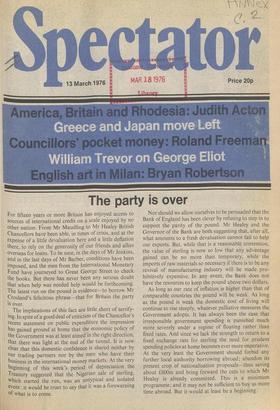The party is over•
For fifteen years or more Britain has enjoyed access to sources of international credit on a scale enjoyed by no Other nation. From Mr Maudling to Mr Healey British Chancellors have been able, in times of crisis, and at the expense of a little devaluation here and a little deflation there, to rely on the generosity of our friends and allies overseas for loans. To be sure, in the days of Mr Jenkins, and in the last days of Mr Barber, conditions have been imposed, and the men from the International Monetary Fund have journeyed to Great George Street to check the books. But there has never been any serious doubt that when help was needed help would be forthcoming. The latest run on the pound is evidence—to borrow Mr Crosland's felicitous phrase—that for Britain the party IS over.
The implications of this fact are little short of terrifying. In spite of a good deal of criticism of the Chancellor's recent statement on public expenditure the impression has gained ground at home that the economic policy of the Government was at least aimed in the right direction, that there was light at the end of the tunnel. It is now Clear that this domestic confidence is shared neither by our trading partners nor by the men who have their business in the international money markets. At the very beginning of this week's period of depreciation the Treasury suggested that the Nigerian sale of sterling, Which started the run, was an untypical and isolated event: it would be truer to say that it was a forewarning of what is to come. Nor should we allow ourselves to be persuaded that the Bank of England has been clever by refusing to step in to support the parity of the pound. Mr Healey and the Governor of the Bank are both suggesting that, after all, what amounts to a fresh devaluation cannot fail to help our exports. But, while that is a reasonable contention, the value of sterling is now so low that any advantage gained can be no more than temporary, while the imports of raw materials so necessary if there is to be any revival of manufacturing industry will be made prohibitively expensive. In any event, the Bank does not have the resources to keep the pound above two dollars.
As long as our rate of inflation is higher than that of comparable countries the pound will be weak. M long as the pound is weak the domestic cost of living will continue to rise steeply, whatever palliative measures the Government adopts. It has always been the case that irresponsible government spending is punished much more severely under a regime of floating rather than fixed rates. And since we lack the strength to return to a fixed exchange rate for sterling the need for prudent spending policies at home becomes ever more imperative. At the very least the Government should forbid any further local authority borrowing abroad ; abandon its present crop of nationalisation proposals—thus saving about £800m and bring forward the cuts to which Mr Healey is already committed. This. is a minimum programme; and it may not be sufficient to buy us more time abroad. But it would at least be a beginning.


































